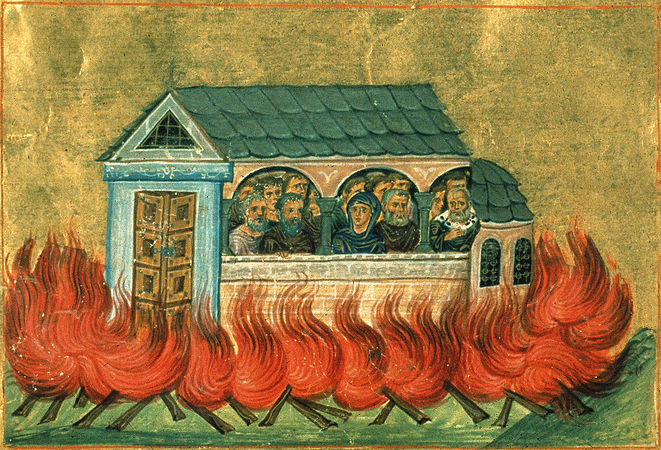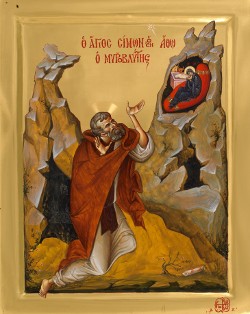|
|
The 20,000 Holy Martyrs of Nicomedia In the time of the wicked Emperor Maximian Hercules, the Christian faith flourished in Nicomedia, and spread from day to day. At one time the Emperor, staying in the city, came to know of the large number of Christians, and he was greatly enraged and devised a means of slaughtering them all. The feast of the Nativity of Christ was approaching, and the Emperor, discovering that all the Christians gathered in the church on this feast, ordered that, on that day, the church be surrounded by soldiers and set alight. When all the Christians were assembled in the church after midnight and the glorious celebration was beginning, the soldiers surrounded the church so that no-one could leave, and the Emperor"s envoy went into the church and told the Christians of the Emperor"s command that they either immediately offer sacrifice to idols or all be burned to death. Then the archdeacon, a courageous soldier of Christ, aflame with divine zeal, began to encourage the people, reminding them of the Three Holy Children in the furnace in Babylon. "Look, my brethren," he said, "at the table of sacrifice in the Lord"s attar, and understand that our true Lord and God will now sacrifice on this; so shall we not lay down our lives for Him in this holy place?" The people were fired with enthusiasm to die for Christ, and all the catechumens were baptised and chrismated. The soldiers then set fire to the church on all sides and the Christians, twenty thousand of them, were burned in the flame singing the glory of God. The church burned for five days, and a smoke with a fragrant and intoxicating smell rose from it, and a marvellous golden light was seen around it. Thus these many men, women and children died gloriously and received wreaths of eternal glory in the Kingdom of Christ. They suffered and were glorified in the year 302. In the time of the wicked Emperor Maximian Hercules, the Christian faith flourished in Nicomedia, and spread from day to day. At one time the Emperor, staying in the city, came to know of the large number of Christians, and he was greatly enraged and devised a means of slaughtering them all. The feast of the Nativity of Christ was approaching, and the Emperor, discovering that all the Christians gathered in the church on this feast, ordered that, on that day, the church be surrounded by soldiers and set alight. When all the Christians were assembled in the church after midnight and the glorious celebration was beginning, the soldiers surrounded the church so that no-one could leave, and the Emperor"s envoy went into the church and told the Christians of the Emperor"s command that they either immediately offer sacrifice to idols or all be burned to death. Then the archdeacon, a courageous soldier of Christ, aflame with divine zeal, began to encourage the people, reminding them of the Three Holy Children in the furnace in Babylon. "Look, my brethren," he said, "at the table of sacrifice in the Lord"s attar, and understand that our true Lord and God will now sacrifice on this; so shall we not lay down our lives for Him in this holy place?" The people were fired with enthusiasm to die for Christ, and all the catechumens were baptised and chrismated. The soldiers then set fire to the church on all sides and the Christians, twenty thousand of them, were burned in the flame singing the glory of God. The church burned for five days, and a smoke with a fragrant and intoxicating smell rose from it, and a marvellous golden light was seen around it. Thus these many men, women and children died gloriously and received wreaths of eternal glory in the Kingdom of Christ. They suffered and were glorified in the year 302.Our Holy Father Simon the Outpourer of Myrrh The founder of the monastery of Simonopetra on the Holy Mountain, he was famed for his asceticism, his visions and his miracles. He entered peacefully into rest and went to Christ in 1257. The founder of the monastery of Simonopetra on the Holy Mountain, he was famed for his asceticism, his visions and his miracles. He entered peacefully into rest and went to Christ in 1257.The Holy Martyr DomnaA virgin and priestess of the foul idols at the court of the Emperor Maximian, she read the Acts of the Apostles one day, came to faith in Christ and was baptised by Bishop Cyril in Nicomedia, together with a eunuch called Indes. St Cyril sent her to a women"s monastery, where blessed Agatha was abbess. When the Emperor began to search for Domna, Agatha dressed her in men"s clothing and sent her to a men"s monastery. This was at the time that the twenty thousand Christians were burned in the church by the Emperor Maximian. Immediately after this, by the Emperor"s command, Ss Indes, Gorgonius and Peter were thrown into the sea with rocks round their necks; Zeno the commander, who had openly denounced the Emperor for his idolatry, was beheaded; St Theophilus, a deacon with Bishop Anthimus, was killed with stones and arrows. Abbess Agatha, the nun Theophila and the nobles Dorotheus, Mardonius, Migdonius and Euthymius were also slain for the sake of Christ. One night, Domna was walking by the sea and saw some fishermen casting their nets into the water. She was grieving deeply for St Indes. Called by the fishermen to help them, she went to their aid and, by God"s providence, drew out three human bodies in the net. Domna recognised Indes, Gorgonius and Peter, took their bodies and gave them burial. When the Emperor learned that a young man was tending and censing the graves of the Christian martyrs, he ordered that he be beheaded, and St Domna was seized and beheaded, and was crowned with a wreath of glory in the heavenly Kingdom with the other martyrs.
|